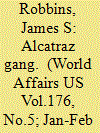|
|
|
Sort Order |
|
|
|
Items / Page
|
|
|
|
|
|
|
| Srl | Item |
| 1 |
ID:
128405


|
|
|
|
|
| Publication |
2014.
|
| Summary/Abstract |
Picture yourself locked "in a dimly lit, windowless concrete box, approximately nine feet long by four feet wide," with a bamboo mat and a bucket, one or both of your ankles locked in irons, left there like a caged animal. Now imagine spending two years there, alone-the isolation interrupted only by routine interrogation and occasional torture sessions, some lasting days-and you are getting close to describing the experiences of a handful of American prisoners of war whose North Vietnamese hosts had designated them as troublemakers. These were the men of Alcatraz. In all, more than three hundred and fifty American servicemen were being held captive by North Vietnam when US involvement ended in 1973. Few tales of American valor are as dramatic and gut-wrenching as those of the Vietnam-era POWs, some of whom were held for eight years, twice the length of US involvement in the Second World War. Defiant, by Alvin Townley, whose previous book chronicled the world of US Navy aviation, is the story of eleven of these captives whose leadership and resistance to their captors' treatment, including efforts to use them for propaganda purposes, caused the North Vietnamese so much trouble they were rounded up, blindfolded, and removed to a special prison they dubbed Alcatraz. They would spend two years there, isolated from the main group of American prisoners, segregated even from one another, forbidden to communicate amongst themselves, and tortured repeatedly for their refusal to capitulate. According to a camp functionary they nicknamed "Rabbit," the Alcatraz Eleven were the "darkest criminals who persist in inciting the other criminals to oppose the Camp Authority." We would call them heroes.
|
|
|
|
|
|
|
|
|
|
|
|
|
|
|
|
| 2 |
ID:
172221


|
|
|
|
|
| Summary/Abstract |
We have heard and read much about the wartime bravery of Gurkha soldiers, the idea of the Gurkhas as a martial race and how British recruitment practices targeted them. But much less is known about the experiences of Gurkha prisoners of war in World War I. The Germans captured thousands of soldiers fighting in the British Indian Army, and among these were a large number of Gurkhas. This imprisonment of soldiers not only served German strategic goals, but also offered a good opportunity to collect source material for research. This paper will briefly shed light on the scholarly activities engaged in by German scholars in Halbmondlager (Half Moon Camp), with a focus on the self-referential writing of one of the Gurkha prisoners of war, Jas Bahadur Rai, who never returned from the camp, but who did bequeath to posterity a song which he sang for the Germans. We will discuss whether Jas Bahadur had freedom of agency while recording his song, and if this song indeed qualifies as life-writing.
|
|
|
|
|
|
|
|
|
|
|
|
|
|
|
|
|
|
|
|
|